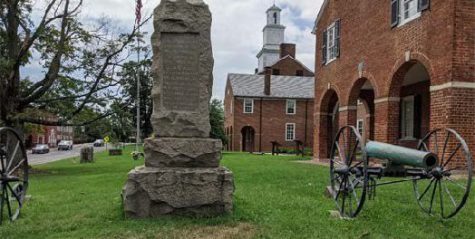Slave descendants deserve reparations

Arguably, Black people have faced some of the toughest hardships like no other minority group in America. The struggle began with slavery and progressively improved as years went on, but that doesn’t change the fact that many Black people are still struggling.
Our country was built on the backs of slaves and immigrants, so it’s only right to reimburse them for the work they did. The history of slavery continues to impact Black people to this day. Racist ideologies stemmed from slavery and slowly passed on to future generations.
The construction of slavery ensured that people of color would continue to struggle and fight to be treated with basic human decency.
The topic of reparations for slavery isn’t anything new. This discussion had been mentioned many times right after the Civil War had ended.
Union General William Tecumseh Sherman had issued an order to give freed slaves 40 acres and a mule. Unfortunately, this order was never carried out.
Although many are for slave reparations, there is a handful of people who are against it.
Many have argued that slave reparations are unnecessary because federal and state governments already spend millions of dollars on welfare, education, healthcare and subsidized housing. They’ve also argued that aren’t any Black slaves that are living today and it’s unfair to American taxpayers.
Those who are in favor of slave reparations believe that many of the problems Black Americans have to face have rooted from slavery and modern-day racism.
Most of the people who are against reparations fail to realize that the claim is not against white people. It’s against the American government. Millions of African Americans have had their inheritance stripped away from them, and most of them struggle to trace back their ancestry.
Also, welfare and subsidized housing have made little to no improvements regarding the socio-economic problems of African Americans.
It’s like putting a Band-Aid on a gunshot wound.
Governor Gavin Newsom of California recently signed a bill in which the state would be forced to develop proposals for the distribution of reparations. This law has enlisted a nine-person task force that will be appointed by Newsom and other leaders.
The state of California has had a long history of slavery and racism even before it had become a state.
This is a huge step forward in a positive direction.
Slave reparations might be expensive, but there are large amounts of debt that have yet to be paid to African Americans.
Slavery affected the way Black people could get jobs, their education and their financial stability. Many of these people grew up lacking the resources that would help them become successful in the future.
In Virginia, there are still many connections to racist leaders. This is due to Virginia’s geography as a Southern state.
For example, in Annandale, there is a street named after Captain John Quincy Marr, a racist Confederate soldier. With Annandale being a majority-minority school, it’s offensive that these areas and monuments have yet to be renamed and taken down.
Students of color should not have to be reminded of slavery every day.
This is another reason why slave descendants deserve reparations.
Many states across the nation honor racist Confederate leaders, yet they ask people of color to forget about slavery because it happened a long time ago.
Yes, no amount of money will make up for the struggles that slaves have gone through, but giving back to the people who are still facing the negative effects of the past must be done.
“People can argue all they want and say that reparations aren’t necessary, but they are,” junior Ugasa Ali said. “Americans don’t want to pay reparations because they know by doing so, they will be admitting that slavery has impacted African Americans and their ability to succeed.”
Many other minority groups have received reparations for the government’s wrongdoing. For example, the Sioux Indians were reimbursed for the land that was wrongfully stolen from them.
The West German government paid reparations to Jewish survivors in concentration camps.
Slavery is one of the focal points in history that has been neglected.
It’s too soon to determine what the plan is, but it’s evident that the American government needs to act on this matter.
With the ongoing political climate, people have been more determined to shed light on the real problems that African-Americans face. As Americans continue to protest and become informed, this topic will continue to gain traction.

Senior Fatima Sayed Eltayeb is currently the Co-Editor in Chief, and this is her third year on staff. Last year, she was the Editorials Editor. Fatima...













